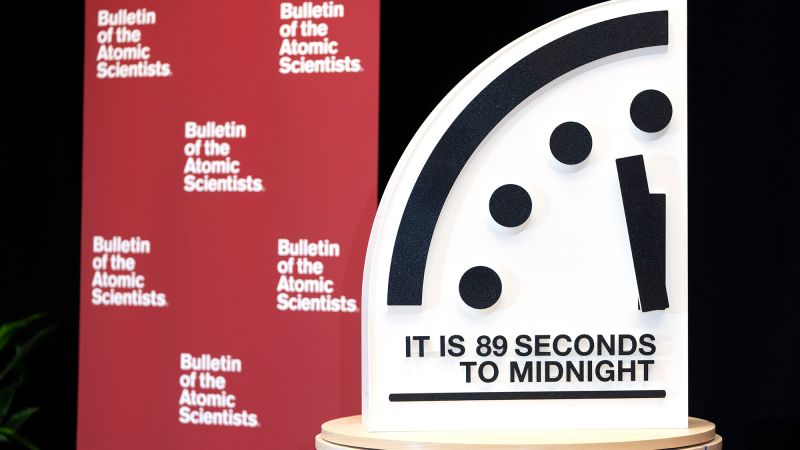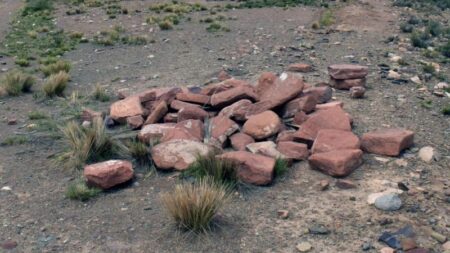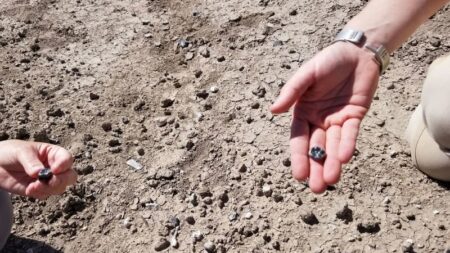In a rapidly changing world fraught with peril, the Doomsday Clock serves as a haunting reminder of humanity’s proximity to self-destruction. Created 78 years ago by scientists as a metaphorical gauge of existential threats, this unique timepiece has predominantly highlighted the tensions brought about by the nuclear age. The latest adjustment made by the Bulletin of the Atomic Scientists set the hand at just 89 seconds to midnight, the closest it has ever been, illustrating the urgent need to address various global crises, including climate change, geopolitical strife, and the rise of destabilizing technologies.
The Doomsday Clock not only reflects the imminent threats to human existence but serves to ignite critical conversations around pressing scientific and societal issues. According to Daniel Holz, the chair of the Bulletin’s Science and Security Board, the decision to set the clock nearer to midnight stems from a lack of significant progress on global challenges, including the ongoing nuclear arms race and climate change’s advancement, exacerbated by misinformation and conspiracy theories that further create discord in public discourse. This alarming announcement reiterates the multifaceted nature of threats facing humanity and the urgent collective action needed to mitigate them.
Historically, the Bulletin of the Atomic Scientists was founded by scientists responsible for the Manhattan Project during World War II, originally focusing solely on nuclear threats. However, this focus expanded in 2007 to include climate change as a critical factor influencing human safety and the health of our planet. This shift showcases how the Bulletin has sought to adapt its mission in light of evolving global challenges, recognizing that climate-related dangers, akin to nuclear threats, necessitate immediate attention and action to avert catastrophe.
Those who determine the clock’s settings each year grapple with complex variables that span time scales and risk levels. The clock’s annual resolution involves various experts and board members, including Nobel laureates, who evaluate the prevailing threats based on scientific insights. Despite the undeniable impact the clock has made in fostering public conversations about existential risks, it is met with skepticism. Critics argue about its effectiveness as a metaphor, putting forth that combining various risks with differing natures and timelines can dilute the message. Notably, Michael E. Mann, a distinguished professor in the earth and environmental science department at the University of Pennsylvania, identified the clock’s significance as a rhetorical device, reminding people of the fragility of human existence.
Amid these discussions, there’s a glimmer of hope. Both Bulletin President and CEO Rachel Bronson and analysts like Eryn MacDonald emphasize the pleasantries of potential reversal of the clock’s impending doom through systematic and bold actions. History shows moments of optimism—a notable instance being when the clock moved 17 minutes away from midnight in 1991, attributed to diplomatic progress amid nuclear disarmament efforts.
Bronson notes that discussing global threats not only cultivates awareness but can also affect policy changes. The anecdote of former UK Prime Minister Boris Johnson citing the Doomsday Clock during a climate conference illustrates how elevating awareness of such threats can translate into actionable change. Furthermore, Bronson encourages meaningful dialogues about the implications of the clock’s time setting and what it signifies for humanity’s future. Engaging peers, she stresses, can inspire leaders to undertake impactful initiatives, affirming that every small change—ranging from altering daily habits like transportation to eating seasonally—can contribute to reversing the damaging impacts of climate change.
By understanding the role of the Doomsday Clock and actively participating in conversations about its significance, society can mobilize collective efforts for progress. Individuals may not always feel their impact directly, but their contributions build a broader momentum necessary for global change. Thus, through awareness, engagement, and seeking sustainable practices, society can work toward reducing the threats that hover ominously over the future of humanity and move the hands of the clock back from the brink of midnight.











